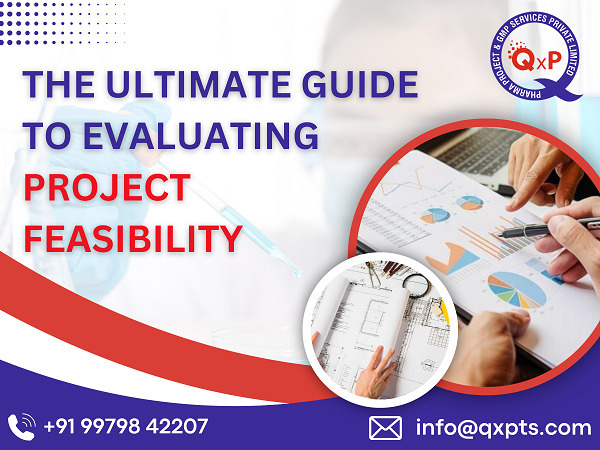Subtotal $0.00
The Ultimate Guide to Evaluating Project Feasibility outlines essential steps for assessing the viability of projects. It includes analyzing costs, risks, timelines, and resources. In the context of the QxP Pharma Project & GMP Services, the guide emphasizes ensuring compliance with Good Manufacturing Practices (GMP), evaluating regulatory requirements, and aligning project goals with industry standards to ensure successful outcomes in pharmaceutical development.
What is Project Feasibility?
Project feasibility involves evaluating if a proposed project is realistic, achievable, and feasible within budget and timeline. It involves analyzing various factors such as technical, economic, legal, operational, and scheduling considerations.
Feasibility studies help mitigate risks and ensure optimal resource allocation. They provide stakeholders with critical insights to make informed decisions.
Features of a Project Feasibility:
1. Technical Feasibility
- Assesses the technical resources, infrastructure, and expertise needed to complete the project.
- Identifies potential challenges in technology, materials, or skill requirements.
2. Economic Feasibility
- Evaluates the project’s financial implications, including cost-benefit analysis, ROI (Return on Investment), and payback period.
- Ensures the project is financially viable.
3. Legal and Regulatory Feasibility
- Verifies compliance with laws, industry standards, and government regulations.
- Important for industries like pharmaceuticals, where GMP (Good Manufacturing Practice) guidelines are mandatory.
4. Operational Feasibility
- Examines whether the project aligns with organizational goals, existing workflows, and resource capabilities.
- Ensures minimal disruption to ongoing operations.
5. Schedule Feasibility
- The team reviews timelines to determine if they can complete the project within the desired timeframe.
- Helps in creating realistic milestones.
Benefits of Conducting a Feasibility Study:
- Risk Mitigation: Identifies potential risks early, allowing for proactive solutions.
- Informed Decision-Making: Provides detailed insights for stakeholders, ensuring data-driven choices.
- Resource Optimization: Ensures efficient use of financial, human, and technical resources.
- Enhanced Credibility: Demonstrates professionalism and due diligence to investors and stakeholders.
- Project Alignment: Ensures the project aligns with strategic goals and market demands.
Advantages of Evaluating Project Feasibility:
Pharmaceutical projects and GMP-compliant operations require precise planning and strict adherence to regulatory guidelines. Feasibility studies in this context offer distinct advantages:
- Regulatory Compliance: Ensures adherence to GMP, FDA, and other regulatory standards, reducing the risk of penalties and delays.
- Optimization of Production Processes: Identifies opportunities to enhance efficiency, quality, and safety in manufacturing processes.
- Facility Design and Validation: Helps design facilities that meet industry standards while optimizing space, workflows, and utilities.
- Risk Management: Identifies potential quality and safety risks, ensuring robust systems are in place to mitigate them.
- Competitive Edge: Provides insights into market trends and demand, helping pharmaceutical companies stay ahead of competitors.
Frequently Asked Questions (FAQs)
1. Why is project feasibility important?
- Project feasibility ensures that a project is viable, cost-effective, and aligned with organizational goals, minimizing risks and maximizing success rates.
2. How long does a feasibility study take?
- Feasibility study duration varies based on project complexity, typically lasting from a few weeks to months.
3. What industries benefit most from feasibility studies?
- While all industries can benefit, feasibility studies are particularly valuable in construction, healthcare, pharmaceuticals, manufacturing, and technology sectors.
4. What is the role of GMP in pharmaceutical projects?
- GMP ensures that manufacturers consistently produce and control pharmaceutical products according to quality standards, safeguarding consumer health.
5. Can a feasibility study guarantee project success?
- While it cannot guarantee success, a feasibility study significantly increases the likelihood of success by identifying potential issues and providing actionable recommendations.
QxP Pharma Project Consultants & GMP Services Provides in Gujarat including locations Andhra Pradesh, Arunachal Pradesh, Assam, Bihar, Chandigarh, Chhattisgarh, Dadra and Nagar Haveli and Daman and Diu, Delhi, Goa, Gujarat, Haryana, Himachal Pradesh, Jammu and Kashmir, Jharkhand, Karnataka, Kerala, Ladakh, Madhya Pradesh, Maharashtra, Manipur, Meghalaya, Nagaland, Odisha, Puducherry, Punjab, Rajasthan, Sikkim, Tamil Nadu, Telangana, Tripura, Uttar Pradesh, Uttarakhand, and West Bengal.
QxP Pharma Project Consultants & GMP Services in USA including locations Alabama, Colorado, Arizona, Alaska, Arkansas, Texas, Delaware, Connecticut, Rhode Island, Florida, Pennsylvania, Washington, Kansas, Hawaii, Louisiana, Vermont, Utah, Illinois, New Jersey, Ohio, Michigan, North Carolina, Virginia, Nebraska, South Carolina, Indiana, Tennessee, Kentucky, Iowa, Idaho, Maryland, Minnesota, Maine, Montana, Nevada, New Hampshire, New Mexico, North Dakota, Massachusetts, Oregon, South Dakota, West Virginia, Wyoming, Missouri, Oklahoma, Mississippi, Wisconsin, Georgia, New York.
Conclusion:
Thorough evaluation is essential to determine a project’s viability. By considering technical, financial, operational, and market aspects, you ensure informed decision-making. Regular reviews and adjustments enhance success chances. Following a structured approach in The Ultimate Guide to Evaluating Project Feasibility will help identify potential risks and opportunities, ensuring better project outcomes and alignment with organizational goals.
View More: Click Here




